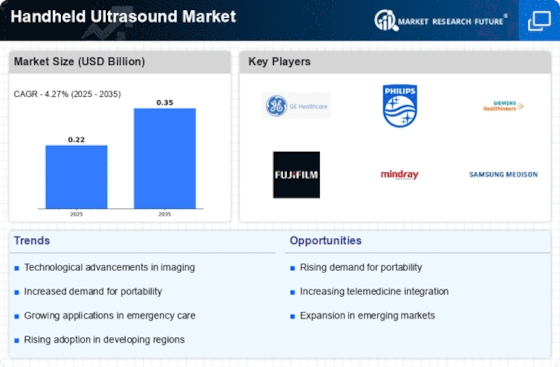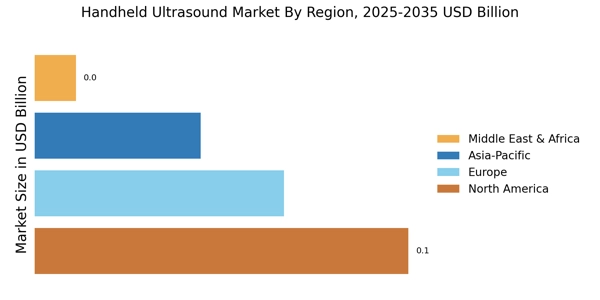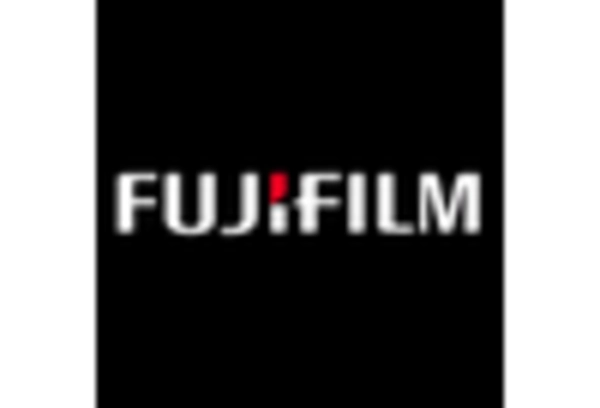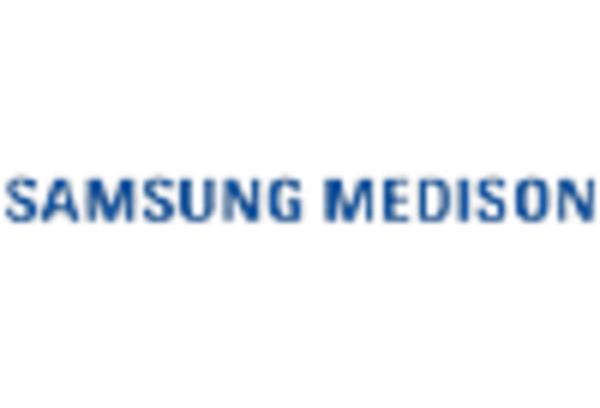Growing Adoption in Emerging Markets
The Handheld Ultrasound Market is experiencing significant growth due to the increasing adoption of ultrasound technology in emerging markets. As healthcare infrastructure improves in these regions, there is a rising demand for cost-effective and portable diagnostic tools. Handheld ultrasound devices offer an accessible solution for healthcare providers in areas with limited resources, enabling them to deliver quality care. Market analysis suggests that the penetration of handheld ultrasound devices in emerging economies is likely to accelerate, driven by government initiatives aimed at enhancing healthcare access. This trend not only expands the market but also promotes equitable healthcare delivery, making ultrasound technology more widely available.
Increased Focus on Training and Education
The Handheld Ultrasound Market is benefiting from an increased focus on training and education for healthcare professionals. As the use of handheld ultrasound devices becomes more prevalent, there is a growing recognition of the need for proper training to maximize their potential. Educational programs and workshops are being developed to equip healthcare providers with the necessary skills to effectively utilize these devices. This emphasis on training is likely to enhance the overall adoption of handheld ultrasound technology, as practitioners become more confident in their abilities to perform and interpret ultrasound examinations. Consequently, this trend is expected to contribute positively to the growth of the market, as a well-trained workforce is essential for the successful integration of handheld ultrasound devices into clinical practice.
Rising Demand for Point-of-Care Diagnostics
The Handheld Ultrasound Market is witnessing a notable increase in demand for point-of-care diagnostics. As healthcare systems strive to provide immediate and efficient care, handheld ultrasound devices are becoming essential tools in various clinical settings. The convenience of these devices allows healthcare providers to perform quick assessments and make informed decisions without the need for extensive imaging facilities. This trend is particularly evident in emergency medicine, obstetrics, and primary care, where timely diagnosis can significantly impact patient outcomes. Market data indicates that the point-of-care ultrasound segment is expected to account for a substantial share of the overall market, reflecting the growing preference for portable and user-friendly diagnostic solutions.
Shift Towards Preventive Healthcare Practices
The Handheld Ultrasound Market is influenced by a broader shift towards preventive healthcare practices. As healthcare providers increasingly focus on early detection and management of diseases, handheld ultrasound devices are being recognized for their role in routine screenings and assessments. This proactive approach not only enhances patient care but also reduces long-term healthcare costs. The ability to conduct quick and non-invasive examinations in various settings, including outpatient clinics and home care, aligns with the goals of preventive healthcare. Consequently, the demand for handheld ultrasound devices is expected to rise, as they facilitate early intervention and monitoring of chronic conditions, thereby supporting the overall trend towards preventive health strategies.
Technological Innovations in Handheld Ultrasound Devices
The Handheld Ultrasound Market is experiencing a surge in technological innovations that enhance the functionality and usability of ultrasound devices. Recent advancements in imaging technology, such as improved resolution and portability, have made handheld devices more appealing to healthcare professionals. These innovations allow for real-time imaging and diagnostics, which are crucial in emergency and point-of-care settings. The market is projected to grow at a compound annual growth rate of approximately 10% over the next five years, driven by these technological enhancements. Furthermore, the integration of artificial intelligence in ultrasound devices is expected to streamline workflows and improve diagnostic accuracy, thereby expanding the applications of handheld ultrasound devices across various medical fields.
.png)

















